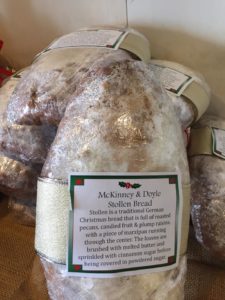There are tons of different Christmas traditions around the world that include things like games, songs, gifts and dance,  but my favorite traditions are edible traditions. Stollen is a traditional German Christmas bread that is full of roasted pecans, candied fruit and pump raisins with a piece of marzipan running through the center. The loaves are brushed with melted butter and sprinkled with cinnamon sugar before being covered in powdered sugar. Sounds delicious, doesn’t it? We make and offer Stollen every Christmas season in the bakery and print that exact mini description right on our label, but today, I thought I’d go deeper and share the full story behind it.
but my favorite traditions are edible traditions. Stollen is a traditional German Christmas bread that is full of roasted pecans, candied fruit and pump raisins with a piece of marzipan running through the center. The loaves are brushed with melted butter and sprinkled with cinnamon sugar before being covered in powdered sugar. Sounds delicious, doesn’t it? We make and offer Stollen every Christmas season in the bakery and print that exact mini description right on our label, but today, I thought I’d go deeper and share the full story behind it.
“As a Christmas bread, stollen was baked for the first time at the Council of Trent in 1545 and was made with flour, yeast, oil and water.
The Advent season [a season observed in many Christian churches as a time of expectant waiting and preparation for both the celebration of the Nativity of Jesus at Christmas and the return of Jesus at the Second Coming] was a time of fasting, and bakers were not allowed to use butter, only oil. In the 15th century, in medieval Saxony (in central Germany, north of Bavaria and south of Brandenburg), the Prince Elector Ernst (1441–1486) and his brother Duke Albrecht (1443–1500) decided to remedy this by writing to the Pope in Rome (!!). The Saxon bakers needed to use butter, as oil in Saxony was expensive, hard to come by, and had to be made from turnips.
Pope Nicholas V (1397–1455), in 1450 denied the first appeal. Five popes died before finally, Pope Innocent VIII, (1432–1492) in 1490 sent a letter to the Prince, known as the “Butter-Letter” which granted the use of butter (without having to pay a fine), but only for the Prince-Elector and his family and household.
Others were also permitted to use butter, but on the condition of having to pay annually 1/20th of a gold Gulden to support the building of the Freiberg Minster. The ban on butter was removed when Saxony became Protestant.
Over the centuries, the bread changed from being a simple, fairly tasteless “bread” to a sweeter bread with richer ingredients, such as marzipan, although traditional Stollen is not as sweet, light and airy as the copies made around the world now.”
I don’t know about you, but I’m glad our version uses butter! It’s hard for me to think of anything that can’t be made better with butter.
Rebecca McKinney
I wanted to create this blog for a few reasons. First and foremost, to share tips, tricks, and knowledge about the food and beverage industry in general but also to help people see a different side of the restaurant world. Every restaurant has a totally unique culture and world within it. I want to help open people’s eyes to more than how fast the service is or how easy or hard it is to secure a reservation.
So, thanks for stopping by! I welcome your ideas, input, and feedback and hope you enjoy!
Eat well & travel often,
Becky McKinney
Latest posts by Rebecca McKinney (see all)
- Why Food Makes the Best Gift for a New Mom - April 12, 2023
- 5 Ingredients to Cook With This Spring - March 15, 2023
- 10 Reasons to Dine Out on Valentine’s Day - February 2, 2023



Leave a Reply